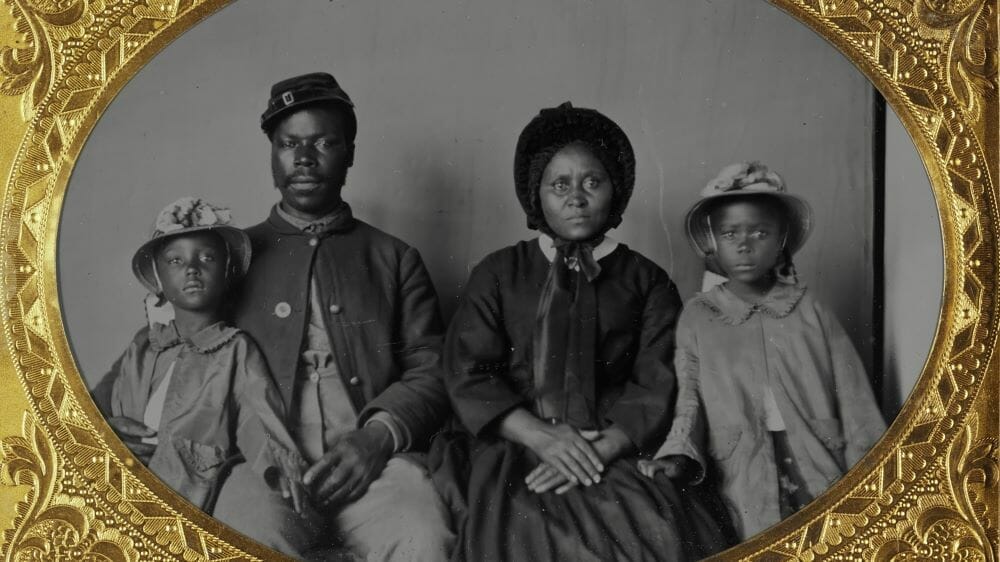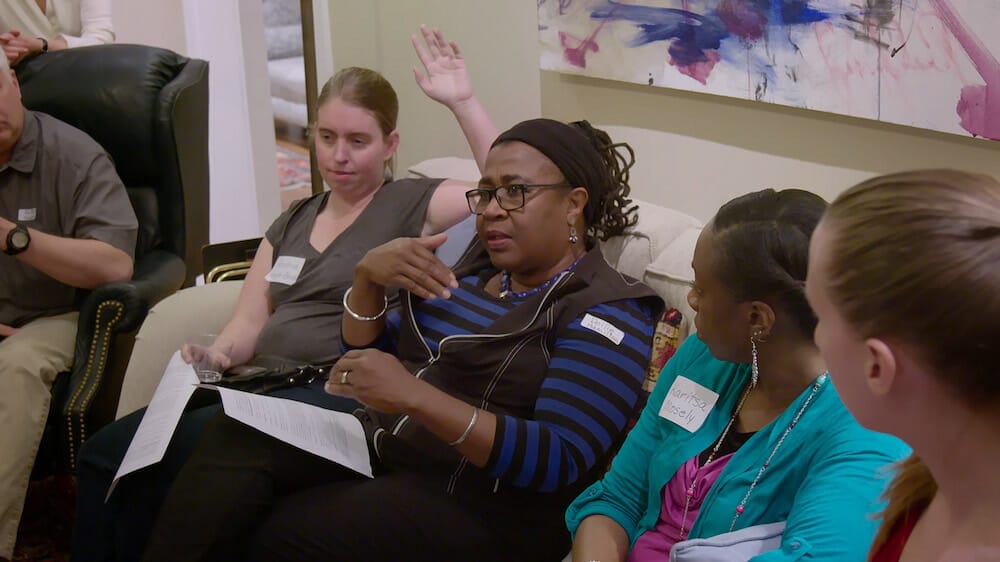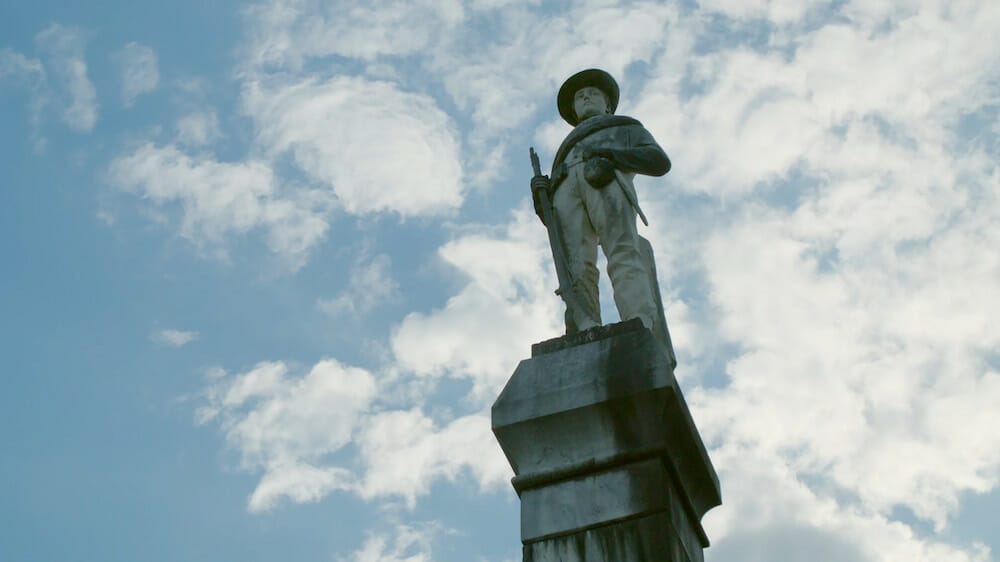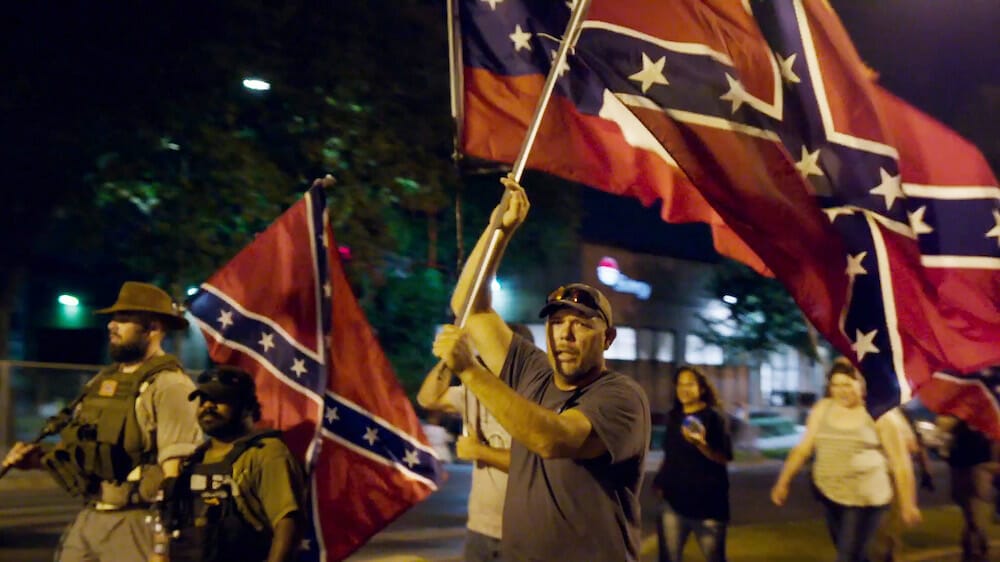The bell rings, signaling the class in this oldest public school in the USA to move on, even though disquieting conversations linger in the air. The students leave behind their seemingly indefatigable teacher, a White woman, whom we can imagine is already planning her next attack on the systemic racism that has a hold on her charges’ minds. She wields primary sources, Socratic methods, and sometimes just flattery. She wants to lay bare the BIGGER lie that gave birth to the big lie of today’s headlines —viz. that slavery was then, and this is now.
This is one of many teachers we meet in filmmaker Rachel Boynton’s cross-country exploration of how the Civil War is taught in our schools and how it continues to shape our national consciousness. They include both Black and White teachers in the deep south in addition to the aforementioned Boston school, professors from the most prestigious universities, and academics with expertise and focus on Reconstruction and the Civil War. We also go with the camera into living rooms, library meeting halls, and close-up conversations with students, keepers of Confederate cemeteries and Civil War re-enactments. Boyton seeks out historic markers of pivotal race riots that the powers that be whitewash in order to preserve their narrative, and more paths that lead from slavery and the Jim Crow response to Reconstruction to the deep racial divide in America.
Some images spicing the film are familiar – like Silent Sam being knocked down by UNC students and similar high-profile retirements of Confederacy monuments, as well as a cringeworthy minstrel show exploitation in a Shirley Temple movie. Others are less everyday, and – at least for this writer – especially shocking. A middle-aged White woman wears a T-shirt with the slogan I Have a Dream – and models the Confederate flag decoration co-mingling with the MLK quote. A father asserts that if there are going to be reparations, it should include payments to his family for all their lost property—meaning slaves. Meanwhile, his grown son sits there squirming; then he asserts that slavery was wrong, but adds the disclaimer that he is still processing. A White teacher in Chattanooga, seemingly well-intentioned with aims to teach empathy, may not notice how the African-American students in his class sit silently as the Black experience remains omitted from his instruction, or at least the parts that we see.
This documentary is star-studded—not in the Hollywood sense but in terms of luminaries who can cut to the chase of the tortured history of slavery, the Civil War, and Reconstruction and how it haunts us today. We learn from Dr. David Blight how the re-unification of the vanquished South with the North after the Civil War was largely made possible by their shared racist ideology. We are reminded by Kellie Carter Jackson, a scholar of Black abolitionists and author of Force and Freedom, how differently violence is perceived when the fighter is Black or White. From Howard University to a curator of the African-American Civil War Museum we learn the history of Black resistance to slavery since Day 1. More, we see what they see—how critical it is to teach this history and especially to African-American students finding their way in a White dominated society. Young students —in intimate one-on-one interviews, or as asides in classroom discussions— give searing snapshots of just where our country is at vis-à-vis race.
CIVIL WAR (OR, WHO DO WE THINK WE ARE) Dives Into Controversy
This is a top pick film for anyone concerned about our country’s future. A conversation starter, to say the least, CIVIL WAR (OR, WHO DO WE THINK WE ARE?), is now making the rounds in various US cities. We learn from the film’s publicists that a recent screening in Texas was so controversial that a scheduled speaker declined to show for fear of losing their job.
Indeed, this film takes us deep into the festering and putrescent wound on the American soul that is slavery and its Jim Crow sequelae. The bell rang a long time ago, signaling us to move on, but we can’t leave. There is still so much to say, and even more that is said but remains unheard. So many historic markers are waiting to be made or unearthed.
HIGHLY RECOMMENDED
Nominate this for The Picture This Post BEST OF 2021???
Click Readers' Choice
Want to see who won the Picture This Post READERS’ CHOICE competition last year?
WATCH THIS SHORT VIDEO—
Director: Rachel Boynton
Writer: Rachel Boynton
Producers: Rachel Boynton and Erika Dilday
Executive Producers:
Henry Louis Gates, Jr., Brad Pitt, Dede Gardner, Jeremey Kleiner, Steven Shainberg, Sam Pollard, Robert S. Kravis, Rick Rosenthall
Editors: Steven Golliday, Mark Juergens, Rachel Boynton
Cinematographer: Nelson Walker
Music: Nathan Larson
To keep track of screenings coming to your area, follow the Facebook page for CIVIL WAR (OR, WHO DO WE THINK WE ARE).
Images courtesy of CIVIL WAR (OR, WHO DO WE THINK WE ARE?)
Click here to read more Picture This Post Review of Top Pick Documentaries and watch this video --
Picture This Post Documentary Reviews RoundUp --Our Top Picks

About the Author: Amy Munice
Amy Munice is Editor-in-Chief and Co-Publisher of Picture This Post. She covers books, dance, film, theater, music, museums and travel. Prior to founding Picture This Post, Amy was a freelance writer and global PR specialist for decades—writing and ghostwriting thousands of articles and promotional communications on a wide range of technical and not-so-technical topics.
Amy hopes the magazine’s click-a-picture-to-read-a-vivid-account format will nourish those ever hunting for under-discovered cultural treasures. She especially loves writing articles about travel finds, showcasing works by cultural warriors of a progressive bent, and shining a light on bold, creative strokes by fledgling artists in all genres.







Nominated for Picture This Post BEST OF 2021